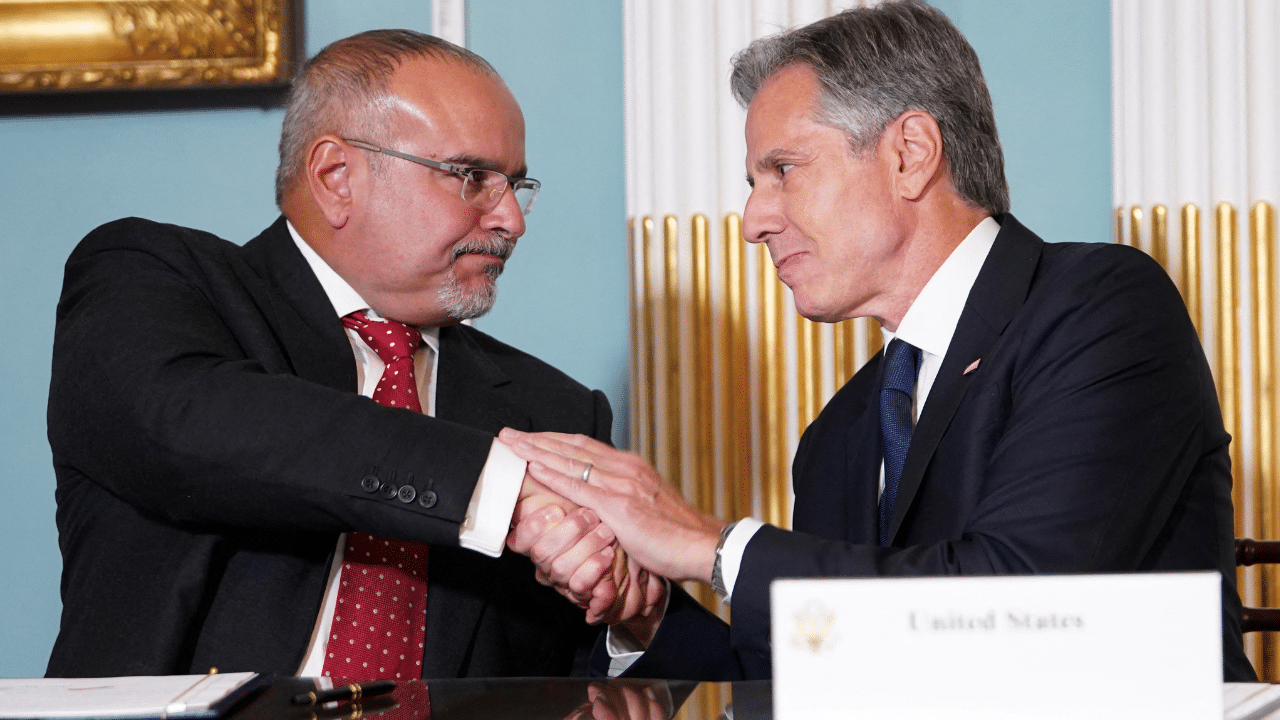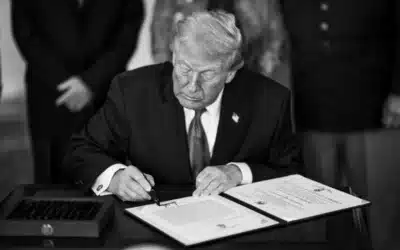Washington and Manama signed a strategic security and economic agreement, which furthers plans to build a US-backed military alliance eyeing Iran in the region, on Wednesday. Concurrently, protests against human rights abuses inside Bahrain are ongoing and the White House is striving to forge a Saudi-Israeli normalization deal.
Dubbed the “Comprehensive Security Integration and Prosperity Agreement,” the deal was signed during a meeting at Foggy Bottom with Secretary of State Antony Blinken and Bahrain’s Crown Prince and Prime Minister Salman bin Hamad Al Khalifa. Blinken said the agreement would boost intelligence and military cooperation between Washington and Manama.
Additionally, there is a provision in the agreement which allows both sides to invite other nations to join the pact, a senior White House official – speaking under the condition of anonymity – told the New York Times. Per the new deal, if the Gulf island nation came under attack, Washington would consult with Manama to determine the best way to “confront the ongoing aggression,” the official said.
Reuters reported that US officials said the deal is legally binding but clarified that it does not reach the threshold of an NATO-style Article V mutual defense commitment.
“We’re looking forward to using this agreement as a framework for additional countries that may wish to join us in strengthening regional stability, economic cooperation and technological innovation,” Blinken declared at the signing ceremony. Blinken has been pushing Arab nations to normalize ties with Tel Aviv, the administration believes deals like these will be enticing to Riyadh and other regimes.
Prince Salman boasted that this deal forms “the foundation for a new global architecture.” He added, “It’s an open agreement… We will be welcoming more members, hopefully.”
Thousands of American troops are based in Bahrain and it is ruled by a notoriously authoritarian monarchy. With the assistance of military forces from the UAE and Saudi Arabia, Manama brutally cracked down on Shi’ite led protests during the Arab Spring which called for an elected parliament and a constitutional monarchy. Bahrain hosts the headquarters of US Naval Forces Central Command along with the Navy’s Fifth Fleet and is one of Washington’s major non-NATO allies.
In 2020, Abu Dhabi and Manama became signatories of the Abraham Accords with apartheid Israel. The accords are a thinly veiled foundation for a regional military coalition led by the US and Israel targeting Tehran. The Joe Biden administration has come under pressure from Congressional hawks since the first year of his term for not expanding the Abraham Accords enough.
There is support in the legislature as well as the Pentagon, and specifically Central Command (CENTCOM), for integrating air and missile defenses among these nations as a way of fostering this burgeoning military alliance.
According to the White House, this new agreement will facilitate this process and build up the region’s “maritime domain awareness.” Iran has begun seizing tankers in the region as a response to the US repeatedly pirating its tankers – utilizing the guise of sanctions enforcement – and profiting millions of dollars by then selling Iranian oil.
The White House has since continued its pattern of escalation by expanding the US military presence in the region in preparation for a confrontation with the Islamic Republic.
Israel also consistently attacks Iranian tankers and ships carrying oil to Syria, Tehran’s war-torn ally. Ancillary to Washington’s economic war against Damascus, the US illegally occupies a third of Syrian territory and controls most of the nation’s oil resources.
Under the Abraham Accords, Gulf dictatorships such as Bahrain recognize Israel – absent an end to the brutal apartheid regime or the formation of a Palestinian state – and in turn receive increased access to advanced US weapon systems.
Washington is also attempting to exploit the arms deals as a way of securing concessions, namely that these countries downgrade their economic ties with Beijing. The normalization agreements with Israel have become severely unpopular among the public in the UAE as well as Bahrain, largely as a result of the Israeli army’s massacres of Palestinians in the occupied West Bank.
Bahrain’s super majority Shi’ite population is ruled by the Sunni Muslim al-Khalifa royal family. Shi’ites are subjected to discrimination and political repression. During the Arab Spring protests, hundreds of political prisoners were taken by the regime, where many were tortured and given life sentences.
Even the State Department has conceded Manama’s abysmal human rights record, including “torture and cases of cruel, inhuman, or degrading treatment or punishment; harsh prison conditions, including lack of sufficient access to medical care in prisons; arbitrary detention; political prisoners; arbitrary or unlawful interference with privacy; restrictions on freedom of expression, the press, and the internet, including censorship… substantial interference with the rights of peaceful assembly and freedom of association… restrictions on freedom of movement, including revocation of citizenship; restrictions on political participation.”
Sayed Ahmed Alwadaei, the director of advocacy at the UK-based Bahrain Institute for Rights and Democracy, complained to the Times that this new deal constitutes a “reward” which the monarchy could interpret as “a green light” to redouble its repression.
On Tuesday, hundreds of prisoners in Bahrain ceased hunger strikes against their cruel conditions, which had gone on for more than a month. Rights groups explained the prisoners halted their strike due to detrimental effects on their health and Manama’s promises to improve the situation. In support of the prisoners, street protests were launched.
The senior White House official speaking with the Times went on to insist that Washington does not “shy away” from the human rights file with Manama. During the signing ceremony, Prince Salman stated that, in the world today, “people are faced by a number of choices: either the rise of authoritarianism, or the growth of libertarianism.”

































